You are here
New Releases
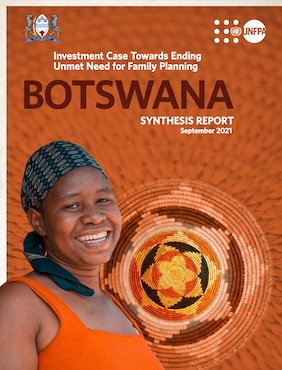
Synthesis report - Botswana: Investment Case Towards Ending Unmet Need for Family Planning
Botswana is an upper-middle-income country with a population of about 2.2 million people. About 35 per cent of the total population is under the age of 15 and the percentage of females aged 15 to 49 years is 50 per cent. Over the past 50 years, the country has experienced a notable demographic transition. Total fertility rate has declined from 6.6 children per woman in 1960 to 3.1 children per woman in 2017. Under-five mortality has been reduced from 152 deaths to 48 deaths per 1,000 live births, while maternal mortality ratio has decreased from 152 deaths to 134 deaths per 100,000 live births over the same period.
Since 1973, the Government of Botswana has shown a strong commitment to family planning by integrating sexual and reproductive health and sexually transmitted infections services into the health system.
This investment case defines the scale and scope of investments needed to provide family planning services in the country. It also provides information on high impact and cost-effective interventions required to accelerate progress towards ending unmet need for family planning in Botswana by 2030.
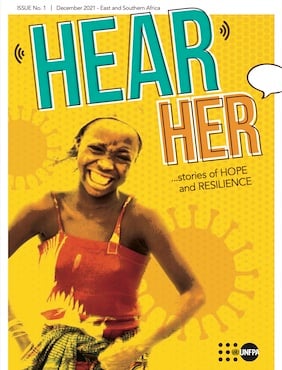
Hear Her
This booklet documents stories of hope to inspire change towards greater sexual and reproductive health and rights in East and Southern Africa. From young activists on child marriage and climate change, to the impact of COVID-19 on women and girls' rights, to efforts to break down myths and taboos around menstrual health, we champion the rights of women and girls in the region.
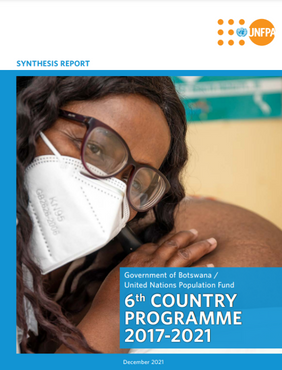
Synthesis Report-Government of Botswana / United Nations Population Fund 6th COUNTRY PROGRAMME 2017-2021
This is a summary of the report on the rapid assessment of the Government of Botswana / United Nations Population Fund (GoB/UNFPA) 6th Country Programme covering all interventions at a national and subnational level between 1 January 2017 and 30 September 2020. The assessment aims to enhance UNFPA accountability and inform the design of the next country programme by identifying the enablers and barriers to implementation, the lessons learned, and recommendations to consider for the next programme. The assessment was structured around the two evaluation criteria of effectiveness and relevance. A mixed-methods approach was used, including a review of strategic planning documents, national policy and planning documents and products of the 6th Country Programme and performance review reports. Data triangulation was conducted through key informant interviews and focus group discussions guided by the evaluation questions. Stakeholders were selected according to the criteria stipulated in the UNFPA Handbook for Evaluation 2018 and included the country office team, some of UNFPA’s key partner ministries, including the ministries of Health and Wellness (MoHW) and Finance and Economic Development (MFED), young people, academia, and civil society organizations.
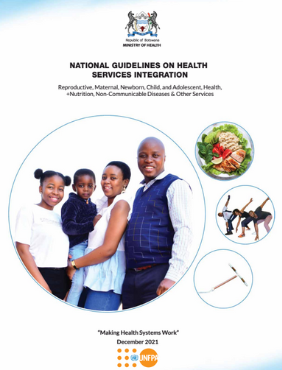
NATIONAL GUIDELINES ON HEALTH SERVICES INTEGRATION
The purpose of these National Guidelines on Health Services Integration is to provide strategic guidance for positioning integrated service delivery as a health development imperative. These guidelines provide suggestions on how to transition to a systematic response to the health needs of individuals, families and communities, in a client-centred manner, whilst following a set of standards and protocols for each service. This is expected to protect safety and quality interests, so as to optimize and exploit opportunities across all levels of care, in all settings (private, public or civil society). These guidelines will support all health service providers from public, private and civil society health care settings to provide holistic, client-centred integrated services that prioritize people’s health needs.
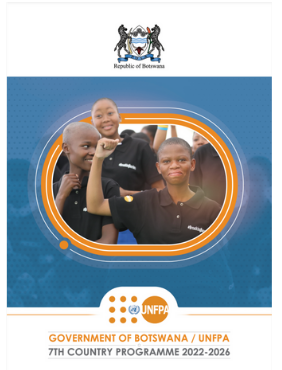
Government of Botswana/UNFPA 7th Country Office Programme
The Government of Botswana/ UNFPA seventh country programme contributes to the national Vision 2036, the eleventh National Development Plan, and, within the context of the Decade of Action, SDGs 3, 5, 10, 16 and 17. The programme is anchored in the United Nations Sustainable Development Cooperation Framework (UNSDCF) 2022-2026 and contributes directly to three of five UNSDCF outcomes by 2026:
(a) gender inequality is reduced, and women and girls are empowered to enjoy their human rights and participate in and benefit from inclusive development;
(b) all people, particularly vulnerable and marginalized groups, have equitable access to high-quality education, health and social protection services; and
(c) Botswana is a more equal, just, and open society, with reduced corruption, where the public is empowered to avail the opportunities and equally participate in decision-making at all levels, and where leaders are accountable, transparent, and responsive.

2020 Orange Book of Results
The Orange Book of Results is a compendium of key results achieved in 2019 by UNFPA's country offices, in line with the UNFPA Strategic Plan 2018–2021. The Orange Book helps UNFPA and other development organizations learn from past experience and strengthen partnerships to achieve results. The third volume of this publication showcases nearly 1,500 results achieved by UNFPA in 2020, a year that challenged the organization to accelerate adaptation in order to enable results delivery in the scenario of the global COVID-19 pandemic.
The individual pages of this publication, as well as additional results from the Strategic Plan indicator framework, can be found in the UNFPA Transparency Portal.

COVID-19 Lockdown Africa Youth Diaries
The UNFPA East and Southern Africa Regional Office through its flagship programme for youth, Safeguard Young People (SYP), as part of the response to COVID-19 engaged young people in the region to find out how they were coping with the current COVID-19 pandemic.
The #YouthandCOVID19 project was launched in May with the aim of sharing best practices among the youth and to expose them to the many interventions and responses to COVID-19 that UNFPA and its partners have put in place during this time. A call to action was shared via the SYP social media platforms and among the youth on the programme's database whereby young people were invited to share their experiences through documentation of their own diaries.

Amidst the COVID-19 Pandemic, Midwives Save Lives
Pregnancy and childbirth are normal and healthy states that most women, couples and families aspire to experience at some point in their lives. However, this life-affirming process also carries the risk of death and disability. Reducing maternal mortality and morbidity remains at the centre of national and international commitments.
Worldwide, the maternal mortality ratio has declined over the past two decades, yet an estimated 295,000 women still die each year due to complications of pregnancy and childbirth, a fourth of which (26 per cent) occurs in the East and Southern Africa region (77,000 maternal deaths per year). Most of these deaths could be avoided if preventive measures are taken and adequate care is availed when needed.
As COVID-19 continues to spread, disrupting maternal and newborn care across the region, UNFPA in East and Southern Africa is working with its partners to reduce the negative impacts of the outbreak and to ensure continuity in sexual and reproductive health services. We stand by our unsung heroes to make sure that they are motivated and working in an enabling environment; that they are properly educated and trained to global standards; and that governments are also committed to fulfilling the ICPD promise to millions of women children and adolescents for universal sexual and reproductive health rights.
The aim of these personal stories from midwives and the findings in this report are to stimulate policy discussions and enable evidence-based decision-making at national and subnational levels, to help countries meet their commitments towards the reduction of preventable maternal death, and to ensure that women and girls fully realize their right to sexual and reproductive health care.
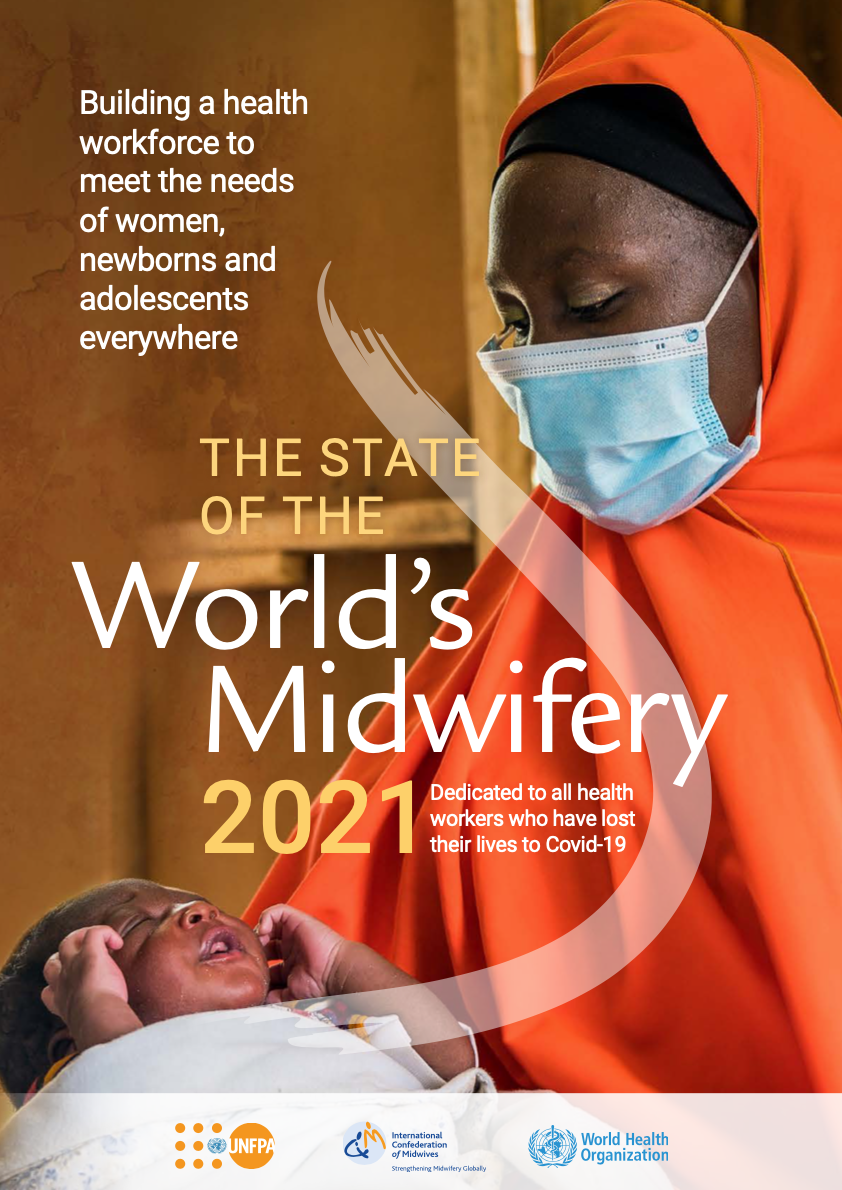
The State of the World's Midwifery 2021
The State of the World’s Midwifery 2021 builds on previous reports in the SoWMy series and represents an unprecedented effort to document the whole world’s Sexual, Reproductive, Maternal, Newborn and Adolescent Health workforce, with a focus on midwives. It calls for urgent investment in midwives to enable them to fulfil their potential.

2020 Annual Report
The UNFPA Botswana 2020 annual report contains key achievements of the country program during last year. Despite the impact of COVID-19, UNFPA continued its efforts to achieve the Three Transformative Results to accelerate the attainment of universal access to sexual and reproductive health and rights.The report honours the commitment of the Government, donors and partners to improve on the ability to offer integrated sexual and reproductive health services to a larger proportion of women and adolescents. Progress has also been sustained in fighting gender based-violence, developing the potential of young people, producing and using data for development; as well as in advocacy and resource mobilization.